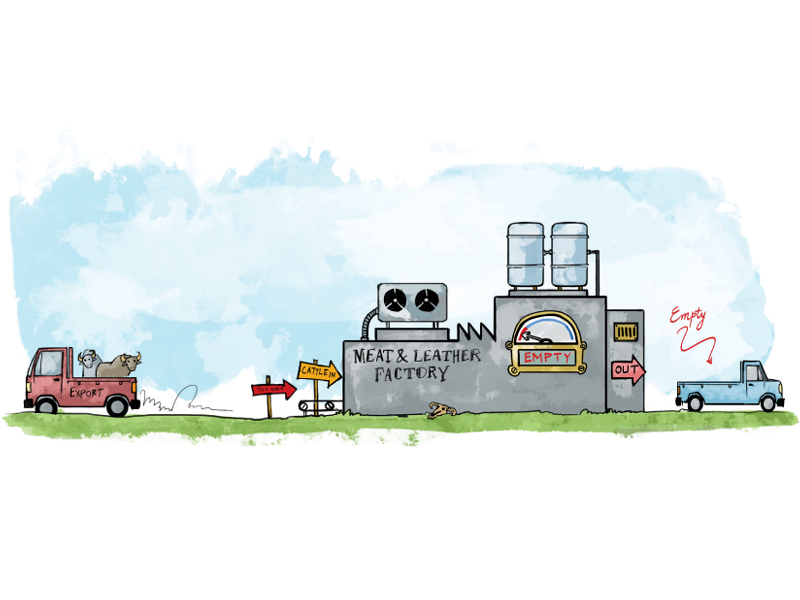
The export of live animals, instead of processed meat, has caused a loss of hundreds of millions of dollars to Pakistan in the last few years and has also pushed up prices of meat and leather in the domestic market.
In the last financial year 2012-13, Pakistan earned $214.5 million on export of processed meat, markedly higher than $20 million earned from export of live animals, sources say.
Earnings from export of by-products through value addition were in addition to these figures.
This disclosure was made in a meeting of the Economic Coordination Committee (ECC) of the cabinet on July 30 this year.
Keeping in view the huge loss because of export of live animals, a representative of the Ministry of Food Security and Research proposed that the government should abandon the low revenue-generating option and slap a ban on animal exports.
The ECC considered a summary submitted by the ministry on the “ban on commercial export of live animals” and decided to impose restrictions on exports with effect from October 1.
Following the ECC decision in March 2009, around 275,000 cattle and 232,424 sheep and goats had been exported to various countries in the last four years. In the meantime, the export of processed beef rose to more than 45,000 tons in the same period.
It was argued in the meeting that the export of processed meat was more advantageous as it fetched better prices in the international market and provided precious by-products such as hides, bones, blood and tallow to many associated industries in the country.
According to a government official, prices of meat have increased sharply in the domestic market in the wake of unchecked export of live animals and said the ban on exports will help in enhancing export of value-added products like meat, meat products and finished leather goods, and bring in foreign exchange.
He pointed out that the export of live animals and smuggling of livestock from Pakistan to Iran, the United Arab Emirates, Afghanistan and other countries had caused acute shortage of raw material for the leather industry and also pushed up meat prices in the country.
Published in The Express Tribune, August 18th, 2013.
Like Business on Facebook, follow @TribuneBiz on Twitter to stay informed and join in the conversation.
COMMENTS (6)
Comments are moderated and generally will be posted if they are on-topic and not abusive.
For more information, please see our Comments FAQ
1731570357-0/elon-musk-(1)1731570357-0-405x300.webp)
-(1)1717678110-0/Kendrick-(1)-(1)1717678110-0-165x106.webp)















Why not ban export of yarn? Using the "low margin" rational you certainly make more money selling clothing and to make matters worse you sell yarn to your competitors in the clothing market. The fact of the matter is that the govt should not be making decisions on whether you sell yarn or live animals - free market does work - either Russia has figured that out.
A decision in the right direction.
It is naivety to say that the farmer do not get cash when processed meat is exported instead of Meat. Because of the high demand of animals, the farmers get cash on the spot when they sell their animals to the exporters and not have to wait for clearance of cheques or forced to sell it to the middle men.
With export based slaughter houses being established and focus on development of poultry industry, export revenues from sale of animals and poultry will increase over the next few years.
@Raza: FYI Pakistan accepted sip load of sheep from Australia that were rejected by the Kuwait and Bahrain. It shows that middle east has higher standard for food quality than Pakistan.
Good decision I think. This will encourage our exporters to move up in the supply chains towards exporting value added goods rather than just supplying raw ingredients (e.g. live cattle) at rock bottom prices to other countries.
The world is a big place, if the the Pakistani exporters cannot come up to USDA standards, they can always export processed meat to Asia or Middle East.
Pakistan does not have infrastructure for modern slaughter house and meat processing that can meet the GMP and USDA/FDA approval or their audit. Policy makers are notorious in making good policy on the paper without current data from the field and get fifteen minutes of fame. Meat from animals that are not stunned prior to slaughter is not acceptable and it is not a common practice in current Pakistan. Second meat processing requires refrigeration right from slaughter house to stove and in between. That means refrigerated buildings, walk-in coolers, refrigerated trucks with automatic alarms to sound off power failure and back up generators etc. Laboratories that meet ISO standards to do microbiological and drug residues etc. Pakistan also does not have trace-ability of meat from farm to fork. Any local and international buyers can see that flies are all over the meat. It is hard work to develop infrastructure and maintain the standard whereas easy money is in exporting the live animal. At least farmer gets the cash in his pocket right away. In last 66 years of history of Pakistan have you ever heard of recall of meat? and those are my submissions.
Excellent decision